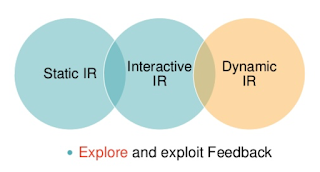[Talk Summary 2] Dynamic Information Retrieval Model
In this seminar, professor Grace Hui Yang presents a dynamic information retrieval model which helps users explore the information space in order to find out which documents are relevant and which aren't, satisfying their information need. The dynamic IR task aims to find relevant documents for a session of multiple queries. It happens when information needs are complex, vague, evolving, often containing multiple subtopics.
A dynamic system is one which changes or adapts over time, based on a sequence of events. While static IR does not learn directly from users and the parameters are updated periodically, dynamic IR is developed from interactive IR which exploits users' feedback to give recommendation or improve the search result or optimize ranking, which is called dynamic ranking principle. But interactive IR just treat interaction independently and response to immediate feedback. Dynamic IR tries to optimize over all interaction, uses it for long term gain and models future user feedback.
Dynamic IR model should be designed in order to have ability to deal with:
- Dynamic users: Users change behavior over time, user history
- Dynamic relevance: User perceived relevance changes
- Dynamic documents: Topic trends, filtering, document content change
- Dynamic queries: Changing queries
- Dynamic information need: Information needs evolve over time
09/09/2016
100 Baker-Porter Hall
Carnegie Mellon University,
Pittsburgh

Comments
Post a Comment